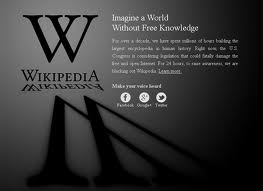The NY Times article (In Fight Over Piracy Bills, New Economy Rises Against Old) by Jonathan Weisman on the proposed anti-piracy legislation in Congress highlights the conflict between old and new business models.
The battle of the SOPA (Stop Online Piracy Act) and PIPA (Protect IP Act) bills signals the changing times. It suggests that public understanding of media use is shifting. It highlights the reallocation of political heft, dollars and lobby power from the old to new economy. It also shows the power of the new communications model of many-to-many. When people are connected across networks, rather than isolated in buckets, word travels fast. Weisman quotes John Feehery, a former House Republican leadership aide, as saying: “… the Internet world, the social media world especially, can reach people in ways we never dreamed of before.”(p.2)
It also shows how fast politicians’ ideologies move when they fear losing votes.
In my mind, the article leaves out some critical information about the proposed legislation of both the House and Senate bills. How do the proposed bills define things like: what is ‘fair use,’ who is responsible for ‘violations,’ who handles enforcement and assigns penalties, and the bigger question is who gets to decide all this. Will enforcement allegedly aimed at the producer and distributor work its way down the entire food chain à la Napster? (Ask yourself how they are going to find out if you have pirated material on your computer.)
At a time when Congress supports the Patriot Act, I’m not willing to trust them to protect individual rights of privacy and due process. Beyond that, the financial burden of the proposed onus of self-policing on providers and sites means that, like with Sarbannes Oxley, only the largest can afford to comply, effectively raising the hurdle on competition. That’s no problem if you’re Disney. Not so good for the rest of us.
Weisman also includes these remarks by former Senator and now chairman of the motion picture lobby, Christoper Dodd*: “… Internet companies might well change Washington, but not necessarily for the better with their ability to spread their message globally, without regulation or fact-checking.” (p.1)
I don’t fear the ability of the Internet to spread a message globally, I celebrate it. And, frankly, I’d like to be in charge of my own fact-checking, given the government’s record. SOPA and PIPA may be stalled at present, thanks to the outpouring of netizens. But that doesn’t guarantee there won’t be an end run that starts us down the slippery slope of the erosion of individual rights, particularly when Congress is proposing legislation designed to control something that is continually evolving and taking business models with it. Not to mention that fact that most legislators don’t appear to understand social technologies, if continual viral ‘oops’ are any indication. On the other hand, this won’t go quietly into the night, nor should it. Theft is wrong, whether it’s IP or rights. And you have to give snaps to the guys who proposed the alternative Online Protection and Enforcement of Digital Trade Act (OPEN). Politicians may not understand the new media environment, but they do get the persuasive power of framing a message in this heated debate. The alternative bill designed to control content has the acronym of ‘OPEN’.
—
*While we’re on the subject of legislation, am I the only one who thinks ex-legislators should be prohibited from becoming lobbyists?


 Dr. Pamela Rutledge is available to reporters for comments on the psychological and social impact of media and technology on individuals, society, organizations and brands.
Dr. Pamela Rutledge is available to reporters for comments on the psychological and social impact of media and technology on individuals, society, organizations and brands.